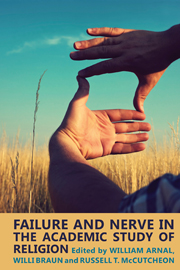The Nerve of Donald Wiebe
Summary
Nihil agit qui diffidentem verbis solatur suis:
Is est amicus, qui in re dubia re juvat, ubi re est opus.
—Plautus, Epidicus 1.2.9I am privileged to count Don Wiebe as one of my closest friends as well as a professional colleague and collaborator. For at least the past twenty years, we have read and criticized virtually everything the other has written (although Don rarely accepts my brilliant suggestions for his rewrites), he is a prolific author and editor (he checks with me regularly to ensure that the number of his publications continues to exceed mine), we recommend new theoretical and empirical studies to one another (Don is an avid reader; some would say promiscuously so), we have collaborated on writing articles, on founding professional societies, on organizing conferences; we have traveled together to, or met in, distant places in attempts to foster the study of religion, we have given lectures at our respective institutions, we have been to one another's home for food and drink (and, yes, Don does occasionally enjoy a gin and tonic [though he continues to prefer his diet soda]). My own professional life has benefited immeasurably from our collaborations (although I must acknowledge that, at times, Don's incessant arguments do push things a bit far. Perhaps our living 800 miles apart has helped; as his Mennonite forebears have it: ‘Ne Hakj tweschen Frind bewoaht ‘ne jreene Frintschoft).
- Type
- Chapter
- Information
- Publisher: Acumen PublishingPrint publication year: 2012



